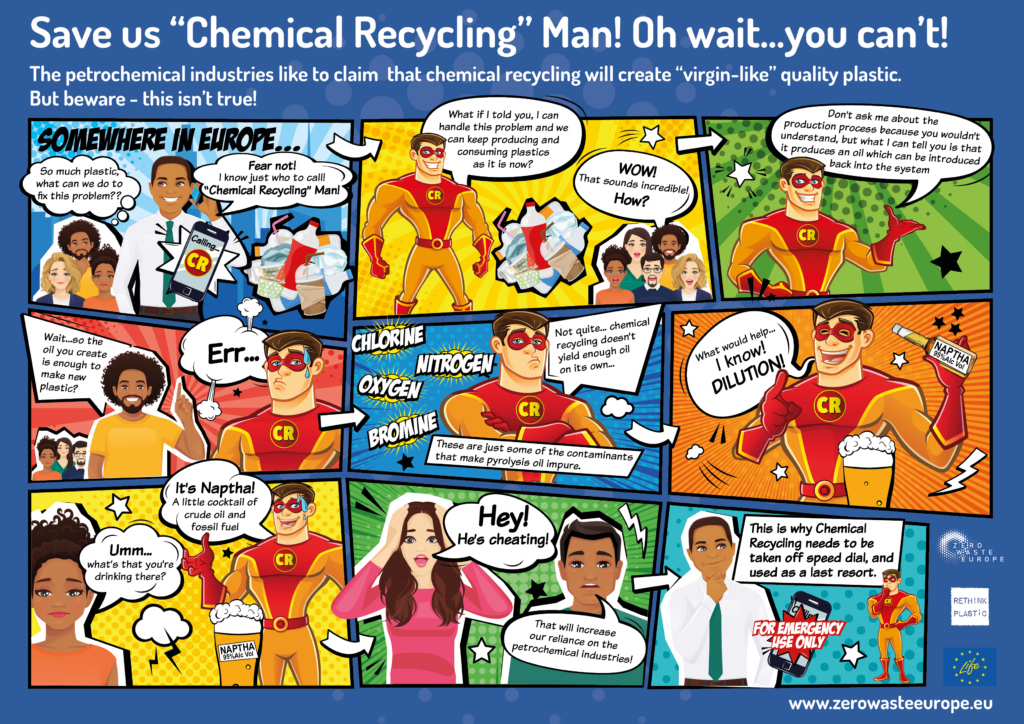What is PVC and what is it used for? Why is PVC dangerous? If PVC has alternatives, why is it not already being replaced? What regulatory measures do NGOs ask for? Answers to frequently asked questions about PVC (polyvinyl chloride).
PVC Problem Very Clear.
Commonly used plastics pose many threats to human health and the environment, making them one of the most pressing environmental issues of our time. But in the landscape of the various plastics that surround us, polyvinyl chloride (PVC) stands out. Not only is it found everywhere, from home furnishings to children’s toys and medical supplies, contributing to widespread, irreversible plastic pollution, but it is also associated with grave toxic effects along its whole life cycle – from production to disposal.
Save us “Chemical Recycling” Man! Oh wait…you can’t!
Meet “Chemical Recycling” Man. Not your run-of-the-mill comic book superhero. This one is propped up by the petrochemical industries.
These industries like to claim that chemical recycling will create “virgin-like” quality plastic. But beware – this isn’t true! Because of low oil yields and contamination, pyrolysis oil must be diluted by a mixture made up of crude oil, derived from fossil fuel (in some cases by a ratio of over 40:1!). Chemical recycling treatment cannot process the diversity of post-consumer plastic waste.
In this handy infographic, developed from Zero Waste Europe’s Leaky Loop ‘Recycling’ report, we visualise the weakness of “chemical recycling” as a method of recycling by personifying “Chemical Recycling” as an arrogant superhero who thinks they can save us all, only to meet their ‘kryptonite’ through the demands of the public for virgin-like quality.

Plastics and Nature entwined. How plastic pollution drives biodiversity loss
Did you know that there is even a new disease impacting seabirds ingesting plastic that has been evidenced and named “Plasticosis”? That is how severe plastic impacts on biodiversity are! It is estimated that close to 2800 different marine species, such as turtles, seabirds, fish, marine mammals and coral reefs, are known to interact with plastic debris, often becoming entangled, trapped or suffocated by it.
Plastic – The (in)Visible Pollution. Plastic pollutes more than what the human eye can see
Emissions from petrochemical sites, plastic production plants, incinerators and landfills pollute the
air and impact the health of surrounding communities and ecosystems. Toxic substances emitted
during the production process also pollute the soil and the water, with impacts on the food we
grow and water we consume, as well as on biodiversity.
Open Letter on Chemicals in the PPWR
In line with our letter sent to Commissioners on 30 November 2023 regarding substances of concern in the Ecodesign for Sustainable Product Regulation (ESPR)1, we are now calling on negotiators to maintain the ambition of the Chemicals Strategy for Sustainability (CSS) within the PPWR.
In particular, we ask the negotiators to:
- Introduce restrictions in the cases of significant risks to human health or the environment with wording aligned with the ESPR, and
- Introduce bans on PFAS and BPA in packaging.
Image by Freepik
SCIP Database – Does it enhance transparency on Substances of Concern in a Circular Economy?
A Roadmap To Nowhere? Assessment of the EU’s bold plan to quit the most harmful chemicals
The EU’s bold plan to quit the most harmful chemicals is a year old. We assess its effectiveness.
A joint report by ClientEarth and the European Environmental Bureau, 25 April 2023.